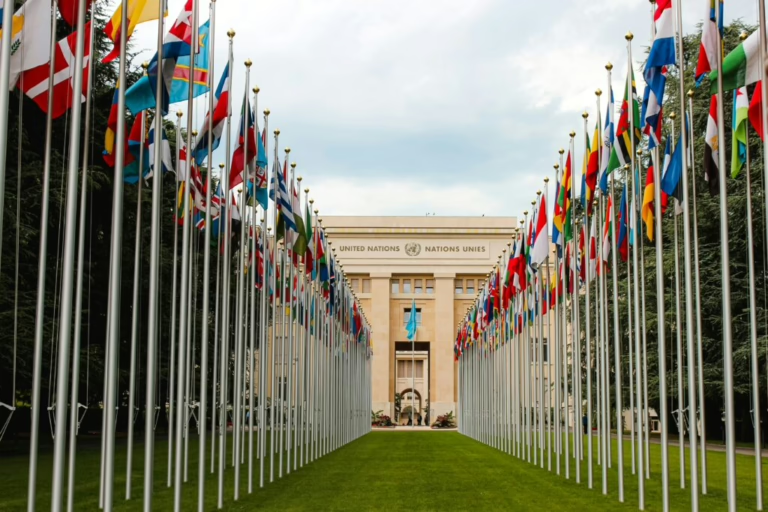Hello BellaStylistas, Connie Aluoch here!
Last week was truly exhilarating as I had the privilege to participate in a series of remarkable events during the 80th United Nations General Assembly (#UNGA80) in New York. One of the highlights was my involvement in a compelling panel titled Africa’s Fashion Future.
The atmosphere was electric! Leaders from governments, business sectors, creative industries, and social change advocates worldwide converged for this milestone UNGA session. Amidst numerous high-level discussions, a standout message emerged: Africa’s creative economy is no longer just emerging-it has firmly established itself and is flourishing.
Across disciplines such as fashion, cinema, music, and visual arts, African creatives are redefining narratives and influencing global culture. I’ve compiled a brief overview of my experience, the pivotal dialogues, and why the global community is finally recognizing what we’ve always known-Africa is the future.
Imagining Africa’s Fashion Landscape
The workshop Imagining Africa’s Fashion Future was spearheaded by Udochi Nwogu, co-founder of Building African Fashion (BAF), in collaboration with designer Kibonen Nfi from the African Fashion Council and Berkley College. This interactive session brought together industry leaders including Andrea Kennedy, head of Fashion Merchandising and Management at Berkley College; Congolese-Ugandan designer Kahindo Mateene of Kahindo NYC; Nigerian designer Niyi Okuboyejo of Post Imperial; futures strategist Jessica Wade; interdisciplinary artist Jodie Lyn Kee Chow; curator Perky Noah Effik; and myself representing African fashion media.
Udochi Nwogu: Strategizing Africa’s Fashion Ecosystem
With a strong foundation in marketing and startup strategy, Udochi positioned the workshop as a collaborative platform to map out strategic directions for Africa’s fashion industry. Her vision centered on uniting diverse stakeholders to explore innovative ideas and forge pathways that will elevate the continent’s fashion sector to global competitiveness.
The discussions emphasized actionable initiatives-ranging from groundbreaking concepts to strategic partnerships-that can solidify African fashion’s global standing. A critical takeaway was the urgent call for African governments to enact supportive policies that foster industry growth and scalability.
Participants actively exchanged insights from both African and international fashion arenas, sparking fresh perspectives on the industry’s trajectory. Through BAF, Udochi and her team are also dedicated to preparing designers to attract investment by helping them build resilient business models and sustainable infrastructures.
Kibonen Nfi: Championing Unity in African Fashion
New York-based Cameroonian designer Kibonen Nfi, co-founder of the African Fashion Council and advisory board member of Creative African Nexus (an initiative by Afrexim Bank), shared her strategic outlook on African designers’ global positioning. She highlighted a persistent challenge: designers often work in isolation, which limits collective growth.
“Collaboration is key. When different players occupy various segments of the value chain, we can build a supportive community that uplifts the entire industry,” she asserted.
Kibonen envisions a unified industry that advocates for resources, lobbies for opportunities, and strengthens infrastructure. She stressed the importance of professionalizing fashion businesses by engaging consultants and forming equity partnerships to ensure sustainable expansion.
The African Fashion Council has made significant progress, notably partnering with the South African Consulate and Jaguar to feature five African designers at New York Fashion Week in September 2024-a historic milestone. Additionally, their collaboration with Berkley College’s Designer-in-Residence program bridges African fashion with academia and the public. Nigerian designer Chuck Collins is among those who have benefited from this residency, following Kibonen’s own participation from 2022 to 2024. Her message to designers is clear: embrace boldness, seize opportunities, and collaborate widely to make a global impact.
Andrea Kennedy: Bridging Academia and Industry
Andrea Kennedy, who leads the Fashion Merchandising and Management program at Berkley College, brings extensive experience in sustainability and circular fashion to her role. She fosters transformative partnerships that connect academic learning with real-world fashion industry demands.
One of her flagship initiatives is the Designer-in-Residence program, which began with Cameroonian brand Kibonen as the first African designer in residence. This program provides designers with showroom space and mentorship opportunities over a year, creating a dynamic exchange that benefits both emerging designers and fashion students.
Berkeley’s alliance with the African Chamber of Commerce further strengthens ties with creatives across Africa, expanding the program’s global reach. Andrea emphasizes that for African designers to thrive internationally, they must deeply understand their target markets and craft compelling brand narratives.
“Success depends on knowing your buyers, tailoring your story to resonate with them, and mastering essentials like packaging, presentation, and pricing strategies,” she explained.
Her approach blends creativity with business savvy, equipping African designers to confidently enter the global fashion arena.
Perky Noah: AI as a Catalyst for African Creativity
Cameroonian-born curator Perky Noah, co-founder of the Black and Brilliant Advocacy Network, focused her presentation on the intersection of African cultural heritage and artificial intelligence. She illustrated how AI can be a powerful tool for preserving traditions while driving innovation within Africa’s creative sectors.
Having previously collaborated with Code Academy on accelerator programs, Perky is now channeling her efforts into integrating AI within the African fashion industry. Using Google Gemini as a demonstration, she reimagined fashion collections and highlighted AI’s potential to streamline cultural archiving.
“Manual processes are time-consuming and resource-heavy. AI opens doors to discovering more efficient and innovative methods,” she noted.
Perky views AI as an opportunity for Africans to develop competitive solutions on the global stage.
“AI won’t replace our jobs; rather, those who harness AI effectively will lead the future,” she affirmed.
However, she cautioned about data protection challenges, which have already led to the appropriation of indigenous designs. She urged African governments to enact strong data protection laws and invest in continental infrastructure such as data centers to secure Africa’s role in the global AI ecosystem.
“Building local data infrastructure is essential to expand AI access and safeguard our creative assets,” she emphasized.
Niyi Okuboyejo: Creators as Cultural Architects
Nigerian designer Niyi Okuboyejo, founder of Post Imperial with bases in New York and Lagos, delivered an insightful talk on the evolving influence of creators in shaping new fashion ecosystems. He explored how creators impact education, identity, and global culture, positioning African fashion as a potent cultural and transformative force.
Okuboyejo highlighted three core concepts. First, he called for a platform for contemporary cultural storytellers, akin to the traditional griots-traveling poets and musicians who preserved history through oral traditions. Today’s creative directors fulfill a similar role by curating culture and shaping narratives.
“This can happen within Africa, where cultural identity fuels fashion brands, and across the Black diaspora, where shared dialogues connect us. For instance, consider how the Adire dyeing tradition resonates in places like Japan and the United States,” he reflected.
His second point stressed the necessity of robust cultural and logistical infrastructure. To transform creative visions into reality, investments in supply chains, community welfare, and sustainable systems are vital. Without these, ideas risk remaining aspirational rather than impactful.
Lastly, Okuboyejo underscored leveraging Africa’s soft power-its rich culture and global influence. Afrobeats and Nollywood exemplify how African creativity has reshaped music and film worldwide. He posed a critical question:
“How can African fashion embody this philosophy, drawing from diverse cultural aesthetics while amplifying our influence globally?”
Kahindo Mateene: Ethical Fashion and Transparency
Kahindo Mateene, a designer with Congolese and Ugandan heritage and founder of New York-based Kahindo NYC, is renowned for her dedication to ethical fashion. She collaborates closely with Kenyan artisans, embedding social impact at the core of her brand.
In her presentation on Radical Transparency and Market Fit, Kahindo highlighted the transformative potential of the Digital Product Passport (DPP). This innovation tracks a product’s entire lifecycle-from raw materials and origin to manufacturing, sustainability practices, repair, and recycling-ensuring accountability and consumer trust.
Jodie Lyn-Kee-Chow: Art, Sustainability, and Afro-Futurism
Afro-Jamaican and Chinese interdisciplinary artist Jodie Lyn-Kee-Chow draws deeply from her Caribbean roots to inform her creative work. She discussed how festivals, performances, and community engagement serve as vital platforms to promote circular fashion and generate new cultural value.
Central to her practice is repurposing recycled fabrics and materials destined for landfills, transforming waste into performance costumes that embody sustainability within her art. For Jodie, this approach is both an environmental statement and a creative contribution to the circular economy.
She also emphasized Afro-Futurism as a powerful narrative lens, blending ancestral heritage with visionary futures. Given the cultural significance of music festivals across the African diaspora, she suggested these vibrant events are ideal spaces to merge fashion, art, and music into a collective story of creativity and sustainability.
My Contribution
As a Kenyan fashion editor, I shared insights on the evolution from traditional print media to dynamic digital platforms like Instagram, YouTube, and TikTok. This digital revolution has birthed a new generation of fashion critics who provide real-time reviews and elevate African designers on a global scale.
The democratization of fashion storytelling means anyone can engage and contribute. Stories from Nairobi and Lagos now reach worldwide audiences instantly, enriched by visuals, videos, community dialogues, and AI-powered tools that generate transcripts, summaries, and translations. This digital shift empowers authentic voices to break barriers, critique with authority, and place African fashion at the heart of global conversations.
Jessica Wade: Design Thinking for Sustainable Fashion
Jessica Wade, a seasoned fashion designer who launched her brand seven years ago, has since pivoted towards design thinking to cultivate meaningful and organic businesses. During the workshop, she encouraged participants to consider how design methodologies can foster sustainable and impactful fashion enterprises.
Jessica outlined three essential pillars: feasibility (practical execution), viability (long-term market sustainability), and desirability (consumer resonance through storytelling and design). She explained that the intersection of these elements forms the foundation for fashion brands that not only survive but thrive.
She also stressed the importance of collaboration, noting that isolated efforts limit growth. Building a pan-African fashion community by sharing resources, knowledge, and strengths can amplify visibility and collectively establish a formidable global presence.




















0 Comments